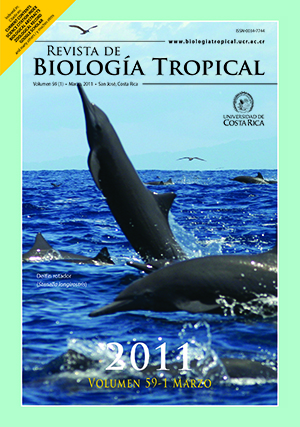Resumen
Information on changes over time in the biodiversity and ecology of tropical systems is of increasing importance against the background of local, regional, and global dynamics. This study aimed to contribute with long-term data on the abundance fluctuations of two species of echinoderms from a tropical tidal flat. From February 1984 to December 1986, March 1985 to April 1987, and July 1994 to September 1996 (total: 76 dates), core samples (17.7cm2, 15cm deep) were collected at low tide at a mud-sand flat in the mid upper Gulf of Nicoya estuary, Costa Rica, as part of a survey of the benthic community. Among more than 100 taxa, the burrowing brittle star, Amphipholis geminata, and the sand dollar, Mellitella stokesii, consistently appeared in the samples over the study period. A total of 63 M. stokesii and 149 A. geminata were collected. The 43 sand dollars found during 1984-1985, give an approximate density of 35 ind./m2 , which is within the range reported for this species. M. stokesii was almost absent from 1994 to 1996, while A. geminata had its peak of abundance at the end of 1995. Low abundances of the sand dollar during the rainy seasons (May-November) and slight increments in dry seasons (December-April) cores, also agrees with a report from the region. A. geminata also presented an irregular pattern of abundance, with slight increases at the end of the rainy seasons or during the dry seasons, when higher salinities are more suitable for echinoderms. The patchy spatial distribution of both species makes difficult the detection of patterns with a corer. Nevertheless, this information is unique due to its extensive time coverage and provides a baseline for future surveys designed specifically for the study of tropical intertidal estuarine echinoderms. Rev. Biol. Trop. 59 (1): 193-198. Epub 2011 March 01.##plugins.facebook.comentarios##

Esta obra está bajo una licencia internacional Creative Commons Atribución 4.0.
Derechos de autor 2011 Revista de Biología Tropical
Descargas
Los datos de descargas todavía no están disponibles.


